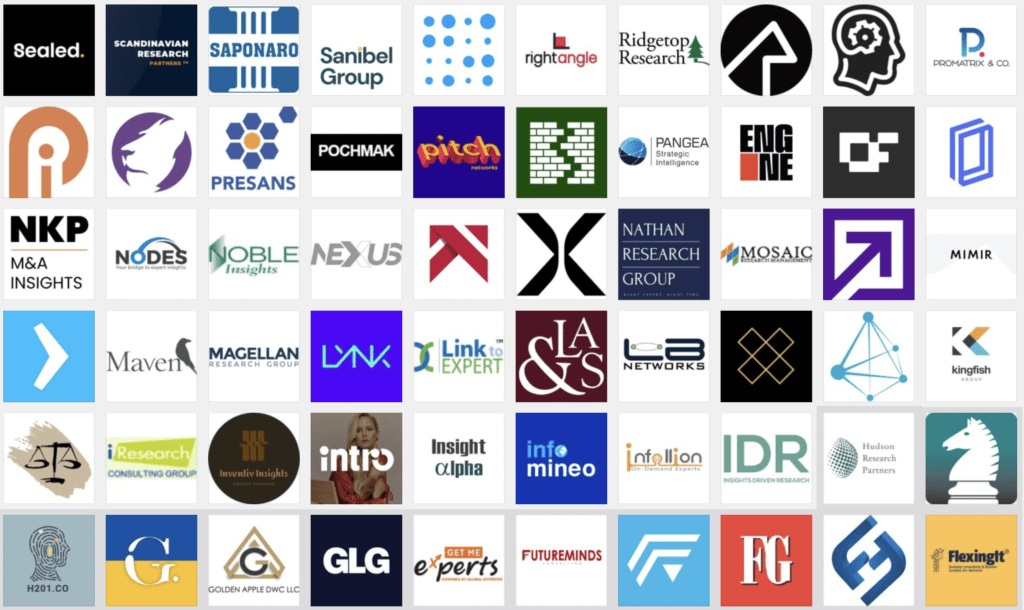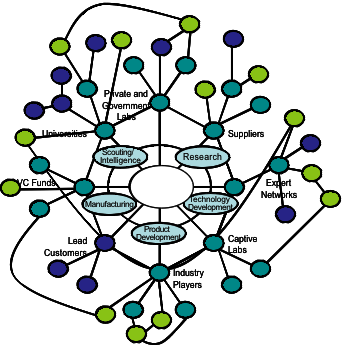What Industries Do Technology Expert Networks Typically Serve?
Welcome to the fascinating world of technology expert networks! Have you ever wondered what industries these networks typically serve? Well, you’re in luck because we’re about to dive into that very question.
Technology expert networks are like secret weapons for businesses looking to stay ahead in today’s fast-paced digital landscape. These networks bring together individuals with specialized knowledge and experience in various industries related to technology.
From cutting-edge software development to innovative hardware manufacturing, technology expert networks serve a wide range of industries. Whether it’s healthcare, finance, e-commerce, or even agriculture, these networks connect businesses with experts who can provide valuable insights and guidance.
So, get ready to explore the diverse industries that benefit from technology expert networks. Join us as we uncover the exciting ways these networks contribute to the success and growth of businesses across the globe. Let’s jump right in!

What Industries do Technology Expert Networks Typically Serve?
Technology expert networks are crucial in connecting professionals with specialized knowledge and experience in various industries. These networks serve a wide range of sectors, facilitating the exchange of information and expertise to drive innovation and growth. In this article, we will explore the industries that technology expert networks typically cater to and the benefits they provide.
1. Technology and IT
The technology and IT industry is one of the primary areas where technology expert networks are highly influential. These networks assist companies in navigating the rapidly evolving technology landscape by connecting them with experts who possess in-depth knowledge of emerging technologies, software development, cybersecurity, cloud computing, and more. Through these networks, businesses can access expert advice, collaborate on research and development projects, and stay ahead of the curve in this ever-changing industry.
In addition, technology expert networks help organizations in IT consulting, infrastructure management, and digital transformation by connecting them with experts who can optimize their IT processes, improve efficiency, and ensure seamless operations. These networks also support professionals in broader technology-related fields such as data science, artificial intelligence, and machine learning.
2. Healthcare and Life Sciences
The healthcare and life sciences industry greatly benefits from technology expert networks. With advancements in medical technology, pharmaceuticals, and research methodologies, these networks connect healthcare professionals, researchers, and industry experts to collaborate on innovative solutions, clinical trials, and drug development.
Experts in this field can provide valuable insights on topics such as telemedicine, electronic health records, medical devices, genomics, and personalized medicine. Technology expert networks in healthcare and life sciences foster knowledge exchange and enable the industry to address challenges, enhance patient care, and create groundbreaking treatments and therapies.
3. Finance and Banking
With the rapid digitalization of the finance and banking sector, technology expert networks play a crucial role in supporting financial institutions. These networks connect professionals specialized in financial technology (Fintech), data analytics, cybersecurity, blockchain, and regulatory compliance.
Experts in finance and banking contribute to the development of secure and efficient banking systems, digital payment platforms, algorithmic trading, risk assessment models, and anti-money laundering measures. By leveraging technology expert networks, financial institutions can access the latest insights and trends, improve operational efficiency, and develop innovative solutions to meet customer demands in an increasingly digital world.
4. Manufacturing and Engineering
Technology expert networks are also prevalent in the manufacturing and engineering industry. These networks connect professionals skilled in industrial automation, robotics, supply chain management, product design, and process optimization.
Experts in this field can assist manufacturing companies in implementing advanced manufacturing technologies, such as the Internet of Things (IoT) and 3D printing, to streamline production, reduce costs, and enhance product quality. By leveraging the knowledge and expertise available through technology expert networks, companies in the manufacturing and engineering industry can stay competitive and drive innovation.
5. Energy and Utilities
The energy and utilities industry greatly benefits from technology expert networks, particularly in the areas of renewable energy, smart grid systems, energy storage, and resource management. These networks connect professionals with expertise in sustainable energy solutions, clean technologies, grid integration, and regulatory frameworks.
By collaborating with experts through technology expert networks, energy and utility companies can accelerate the transition to a greener future, optimize resource utilization, and improve the overall efficiency and reliability of energy systems. These networks facilitate knowledge sharing, research collaborations, and the development of innovative technologies that address the industry’s challenges and move towards a more sustainable energy landscape.
6. Retail and E-commerce
Technology expert networks have a significant impact on the retail and e-commerce industry. These networks connect professionals specializing in e-commerce platforms, supply chain optimization, customer experience, data analytics, and digital marketing.
Experts in this field can help retailers and e-commerce businesses optimize their online presence, improve logistics and inventory management, enhance the customer journey, and implement data-driven marketing strategies. By leveraging technology expert networks, companies in the retail and e-commerce sector can stay competitive in the digital marketplace and meet the evolving demands of tech-savvy consumers.
7. Transportation and Logistics
The transportation and logistics industry benefits from technology expert networks by providing insights into areas such as autonomous vehicles, smart transportation systems, route optimization, and supply chain visibility. These networks connect professionals specializing in transportation technology, logistics management, and urban planning.
Experts in this field can assist organizations in improving efficiency, reducing transportation costs, and mitigating environmental impact through the adoption of emerging technologies. By leveraging technology expert networks, transportation and logistics companies can stay abreast of industry trends, explore innovative solutions, and transform their operations to meet the demands of a rapidly evolving global marketplace.
Benefits of Technology Expert Networks
Enhanced Knowledge Exchange
Technology expert networks facilitate knowledge exchange and collaboration among professionals in various industries. By connecting individuals with specialized expertise, these networks foster innovation and drive the dissemination of cutting-edge knowledge. This enables industries to stay updated with the latest trends, advancements, and best practices, ultimately leading to improved products, services, and processes.
Access to Specialized Expertise
Technology expert networks provide businesses with access to specialized expertise that might not be available within their own organizations. This can be particularly beneficial in rapidly evolving industries such as technology and healthcare, where staying up-to-date with the latest developments is essential. By leveraging the collective knowledge and experience of experts, organizations gain valuable insights, guidance, and support to solve complex challenges and make informed decisions.
Opportunities for Collaboration
Technology expert networks create opportunities for collaboration and partnerships. By bringing together individuals from diverse backgrounds and industries, these networks facilitate interdisciplinary collaboration, enabling professionals to pool their expertise and resources to tackle complex problems. Collaborative efforts foster creativity, innovation, and the development of groundbreaking solutions that can drive industry-wide advancements.
Conclusion
Technology expert networks serve a wide range of industries, including technology and IT, healthcare and life sciences, finance and banking, manufacturing and engineering, energy and utilities, retail and e-commerce, and transportation and logistics. These networks provide access to specialized expertise, foster knowledge exchange, and create opportunities for collaboration. By leveraging the collective knowledge and experience of experts, businesses can stay ahead of the curve, drive innovation, and meet the evolving demands of their respective industries.
Key Takeaways
- Technology expert networks serve a wide range of industries such as healthcare, finance, retail, manufacturing, and telecommunications.
- These networks connect professionals in the technology sector with companies seeking their expertise in specific industries.
- Experts in technology networks can provide valuable insights and guidance to businesses in their respective fields.
- By leveraging the expertise of these networks, companies can stay updated on the latest technological advancements and industry trends.
- Technology expert networks play a crucial role in facilitating knowledge exchange and collaboration across different industries.
Frequently Asked Questions
Are you curious about the industries that technology expert networks typically serve? Look no further! Below, we have answered five common questions related to this topic.
1. How do technology expert networks benefit the healthcare industry?
Technology expert networks play a crucial role in the healthcare industry by providing insights and expertise on digital innovations. These networks connect healthcare organizations with professionals who specialize in healthcare technology, telemedicine, electronic medical records, and more. By tapping into the knowledge of these experts, the healthcare industry can stay at the forefront of advancements, ensure patient data security, and improve patient care.
For example, technology expert networks help healthcare organizations implement electronic health record (EHR) systems, optimize clinical workflows, and enhance telehealth capabilities. These networks also assist in developing innovative solutions like wearable health devices and artificial intelligence applications.
2. In what ways do technology expert networks support the financial services industry?
Technology expert networks greatly assist the financial services industry by offering specialized knowledge in areas such as financial technology (fintech), cybersecurity, data analytics, and blockchain. By working closely with experts in these fields, financial institutions gain valuable insights into emerging technologies and regulatory requirements.
For instance, technology expert networks help banks and financial institutions assess potential risks, implement secure digital banking solutions, and enhance fraud detection strategies. These networks also facilitate the integration of advanced analytics and AI tools into financial decision-making processes, leading to improved customer experiences and better risk management.
3. How can technology expert networks support the retail industry?
Technology expert networks provide vital support to the retail industry through their expertise in areas like e-commerce platforms, supply chain optimization, data analytics, and customer relationship management (CRM) systems. By leveraging the knowledge of technology experts, retailers can enhance their online presence, optimize operations, and deliver personalized customer experiences.
For example, technology expert networks assist retail businesses in implementing and integrating omnichannel strategies, enabling seamless shopping experiences across multiple platforms. They also help retailers analyze customer data to deliver targeted marketing campaigns, refine inventory management strategies, and identify emerging market trends.
4. What role do technology expert networks play in the manufacturing industry?
Technology expert networks play a crucial role in the manufacturing industry by providing guidance on various technological aspects, including automation, robotics, internet of things (IoT), and advanced manufacturing processes. These networks help manufacturers adopt innovative technologies that improve operational efficiency, product quality, and sustainability.
For instance, technology expert networks assist manufacturers in implementing smart factory technologies, optimizing production lines, and leveraging data analytics for predictive maintenance. They also provide expertise in areas like additive manufacturing, which enables cost-effective prototyping and reduces time-to-market for new products.
5. How do technology expert networks support the energy sector?
Technology expert networks offer valuable support to the energy sector by providing insights into renewable energy technologies, grid optimization, energy storage, and cybersecurity. These networks help energy companies navigate the evolving landscape of clean energy solutions, improve energy efficiency, and ensure the security of critical infrastructure.
For example, technology expert networks assist energy companies in implementing renewable energy projects, integrating distributed energy resources, and developing smart grids. They also provide expertise in securing energy infrastructure against cyber threats, ensuring the reliable and secure operation of power systems.
EXPERT NETWORK
Summary
Technology expert networks serve a wide range of industries, helping them solve complex problems. These networks connect companies with knowledgeable professionals who provide valuable insights and expertise. By tapping into these networks, industries like healthcare, finance, and technology can stay ahead of the curve and make informed decisions.
These expert networks offer expertise in various fields, including artificial intelligence, cybersecurity, and healthcare technology. Companies in these industries can benefit from the knowledge and advice of these experts to innovate, improve operations, and optimize their strategies. By leveraging the power of technology expert networks, industries can thrive in today’s fast-paced and ever-changing world.


